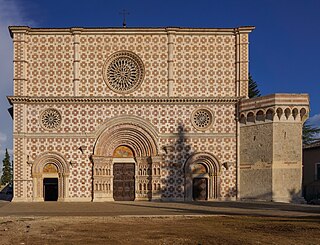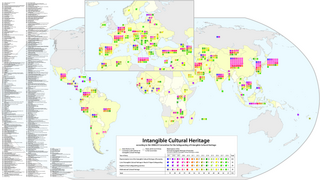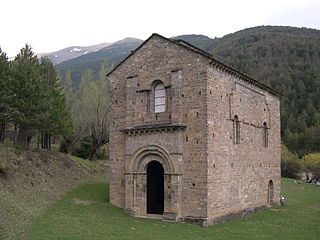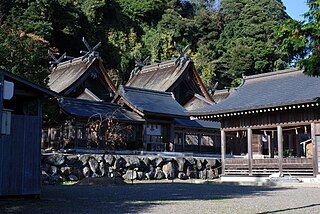
Santa Maria di Collemaggio is a large medieval church in L'Aquila, central Italy. It was the site of the original Papal Jubilee, a penitential observation devised by Pope Celestine V, who is buried there. The church, which therefore ranks as a basilica because of its importance in religious history, sits in isolation at the end of a long rectangular sward of grass at the southwest edge of the town.

The Procession of the Holy Blood is a large religious Catholic procession, dating back to the Middle Ages, which takes place each Ascension Day in Bruges, Belgium. In 2009, it was included in the UNESCO Representative List of the Intangible Cultural Heritage of Humanity.

Pukllay or phukllay is a traditional festival held in the central Andes. The word "play" refers to either the clouds or the blossoms "playing" in the winds at the end of the rainy season and thus harvesting time. The Bolivian Pukllay is connected to the Christian carnival and the celebration of a battle won over the Spaniards – hence the appropriation of the Spanish helmets and spurs one can still see in the ritual dance.

Spycimierz is a village in the administrative district of Gmina Uniejów, within Poddębice County, Łódź Voivodeship, in central Poland. It lies approximately 4 kilometres (2 mi) south-west of Uniejów, 15 km (9 mi) west of Poddębice, and 52 km (32 mi) west of the regional capital Łódź. The village is known for celebration of the Corpus Christi feast when the inhabitants create flower carpets along the 2 km long route of the procession.

UNESCO established its Lists of Intangible Cultural Heritage with the aim of ensuring better protection of important intangible cultural heritages worldwide and the awareness of their significance. This list is published by the Intergovernmental Committee for the Safeguarding of Intangible Cultural Heritage, the members of which are elected by State Parties meeting in a General Assembly. Through a compendium of the different oral and intangible treasures of humankind worldwide, the programme aims to draw attention to the importance of safeguarding intangible heritage, which UNESCO has identified as an essential component and as a repository of cultural diversity and of creative expression.

A bien de interés cultural is a category of the heritage register in Spain. The term is also used in Colombia and other Spanish-speaking countries.
Yūki-tsumugi (結城紬) is a variety of silk cloth produced in Japan, chiefly in Yūki in Ibaraki Prefecture. It is designated as one of the Important Intangible Cultural Properties of Japan, and has also been inscribed on the UNESCO Representative List of the Intangible Cultural Heritage of Humanity.
Akiu no taue odori (秋保の田植踊) is a traditional rice-planting dance in Akiu, now part of Sendai, Miyagi Prefecture, Japan. Performed since the seventeenth century, ten female dancers accompanied by two or four males enact a repertoire of six to ten dances to the sound of flute, drums and bells. In 1970 measures were taken to document the dance and in 1976 it was designated an Important Intangible Folk Cultural Property. In 2009 Akiu no taue odori was inscribed on the UNESCO Representative List of the Intangible Cultural Heritage of Humanity.

Sada Jinja (佐太神社) is a Shinto shrine in Matsue, Shimane Prefecture, Japan. The Taisha-zukuri north, central and south halls of 1807 are Important Cultural Properties.

Traditions of Italy are sets of traditions, beliefs, values, and customs that belongs within the culture of Italian people. These traditions have influenced life in Italy for centuries, and are still practiced in modern times. Italian traditions are directly connected to Italy's ancestors, which says even more about Italian history.

A pütchipü'ü, or pütche'ejachi, is the central element in the traditional administration justice system of the Wayuu people. The role of a pütchipü'ü is to solve conflicts through mediation and negotiation. This can include conflicts between different members or clans of the Wayuu community or with people or organizations outside the Wayuu people. This negotiation includes material compensation to be paid by the aggravating family to the aggrieved family group.
The Cultural Properties of Costa Rica refer to those tangible and intangible cultural properties that by decree has been awarded the distinction of being part of the cultural heritage of Costa Rica.
Intangible cultural heritage (ICH) includes traditions and living expressions that are passed down from generation to generation within a particular community.

Cante Alentejano is a Portuguese music genre based on vocal music without instrumentation from the Alentejo region. It was inscribed in 2014 in UNESCO's Representative List of the Intangible Cultural Heritage of Humanity, one of two Portuguese music traditions, the other being Fado. Its origins come from a similar popular music genre created in the region of Minde by campinos. It is said that the habit of singing without instruments was common in bull-herding as a means to coordinate efforts among the campinos.
The Saudi Heritage Preservation Society (SHPS) is a Saudi charitable society established on 17 May 2010 and concerned with the preservation of national heritage where the constituent meeting was held in the National Museum of Saudi Arabia. It has been registered by UNESCO as an international nongovernmental organization in safeguarding heritage.
This page is based on this
Wikipedia article Text is available under the
CC BY-SA 4.0 license; additional terms may apply.
Images, videos and audio are available under their respective licenses.










